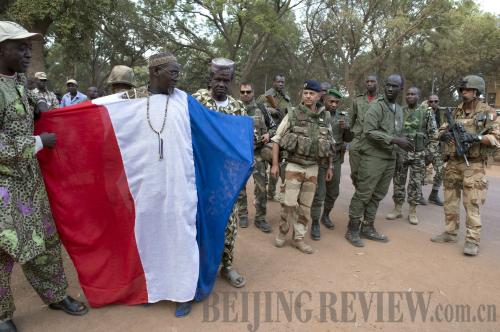|
 |
|
OPEN ARMS: A man wearing a cloth outfit in the design of the French national flag greets French and Malian soldiers in Niono on January 19 (XINHUA/AFP) |
Turmoil in the DRC is an old problem stemming from cross-border ethnic conflicts in the African Great Lakes region as well as conflicts between Hutus and Tutsis, the DRC and neighboring countries, and North Kivu Province and Kinshasa. Since April 2012, the anti-government M23 Movement has been clashing with government troops. On November 20, it captured Goma, capital city of North Kivu.
In spite of sporadic turbulence in sub-Saharan Africa, the general situation was relatively stable in 2012. Elections were held successfully in more than 20 countries in sub-Saharan Africa, demonstrating that multi-party democracy is beginning to take root. Power shifts went smoothly after top political leaders passed away. In 2012, Malawi's President Bingu wa Mutharika, Ghana's President John Atta Mills and Ethiopia's Prime Minister Meles Zenawi died, and the three countries saw peaceful and stable transitions.
Moreover, some hotspot issues became less intense. Issues in Sudan and Somalia took progressive steps, with the latter electing its parliament and president in 2012, ending the 21-year-long political interim period. On September 27 last year, Sudan and South Sudan signed cooperation framework agreements on maintaining border area security and restarting oil cooperation with the mediation of the international community.
The AU and sub-regional organizations are playing a more active role in protecting regional peace and stability. Al Shabaab militants were driven out of major Somali cities, for instance, giving the country space to stabilize. The AU and the Economic Community of West African States conducted military intervention in the Mali crisis, while the AU and the Economic Community of Central African States actively intervened in the civil war of the Central African Republic.
Encouraging economy
The economy in sub-Saharan Africa maintained relatively fast growth in 2012. The IMF predicted in an October 2012 report that the economic growth rate will be 5 percent in 2012 and 5.7 percent in 2013, obviously higher than the average level of the world. The IMF also predicted that seven African countries will be among the world's top 10 fastest-growing economies by 2015. Goldman Sachs recently compared the business opportunities in Africa to what China offered in the early 1990s. In its Doing Business 2013 report, the World Bank said of the 50 economies making the greatest improvement in business regulation for domestic firms since 2005, 17 are in sub-Saharan Africa.
Forbes magazine announced that the net value of 40 African billionaires in 2012 was $72.9 billion, increasing 12 percent from that in 2011. Among the 40 billionaires, 12 are South Africans, 11 are Nigerians, eight are Egyptians and five are Moroccans.
The African economy has been developing rapidly in the past decade with a growth rate of 5-6 percent, except for 2009, when the global financial crisis caused the rate to fall to 1.6 percent. An improving security situation and higher prices of primary commodities help the African economy develop. Another important driving force is strengthened cooperation between Africa and emerging economies such as China.
| 